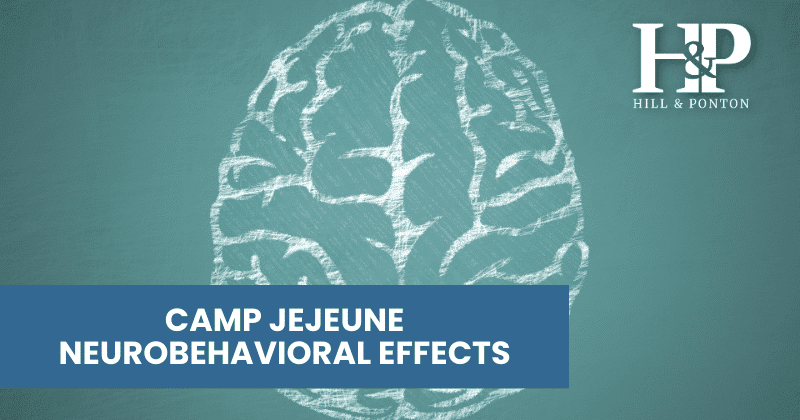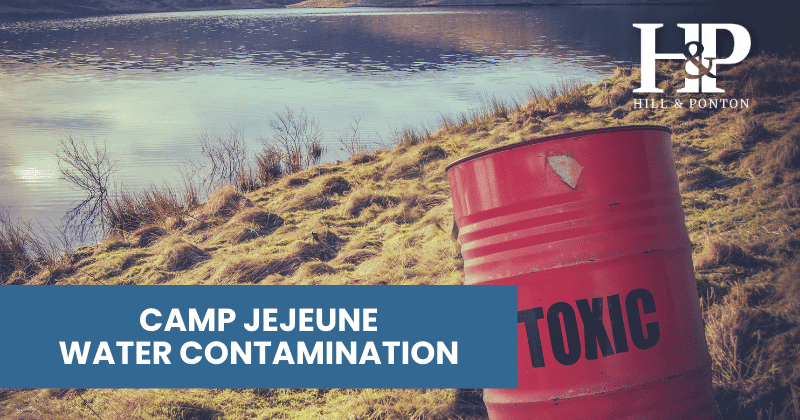Certain United States military veterans may be eligible for disability benefits based on presumptive conditions. In these cases, veterans do not need to prove a service connection.
Rather, the VA presumes that the condition is connected to military service because the veteran meets a certain set of criteria. Vietnam veterans qualifying for conditions connected to Agent Orange exposure is a common example.
A perhaps lesser-known example of presumptive conditions are those connected to the contaminated drinking water supply at Marine Corps Base Camp Lejeune.
Certain veterans, family members, civilians, and reservists who were stationed at Camp Lejeune during a certain period are presumed to have had long-term exposure to this contamination.

Honoring Our Pact Act of 2022 Bill
Big news for many exposed to the toxic water at Camp LeJeune! The Honoring Our PACT ACT of 2022 bill that awaits a vote incorporates sections of the Camp Lejeune Justice Act.
This is a distinct lawsuit action that can be taken by not just veterans, but also civilians like their families who would be able to file for damages caused by the contaminated water at Camp LeJeune.
This bill allows aid for anyone stationed on the base and exposed to hazardous water, and it also includes civilian workers and their families, dependents of veterans, and even those exposed in utero.
If you believe you were affected by Camp LeJeune’s contaminated water, fill out the form below to see if you can qualify under the PACT Act!
What is Camp Lejeune?
Camp Lejeune, North Carolina is the only base in the United States with such severe contamination that it carries its own presumptive conditions. Those stationed there between 1953 and 1987 are presumed to have consumed contaminated water.
The water contained chemicals including trichloroethylene (TCE) and tetrachloroethylene/perchloroethylene (PCE), both of which can have damaging health effects.
There were approximately one million active duty, reservists, civilians, and family members in this exposure group.
The water they were drinking was so contaminated that the VA created the Caring for Camp Lejeune Families Act of 2012 and VA Rule 38 CFR 3 effective March 14, 2017, thus making the following health conditions presumptive and offering free health care to military and family members stationed at the site.
| Adult-onset Leukemia | Aplastic Anemia | Liver Cancer |
| Bladder Cancer | Kidney Cancer | Parkinson’s Disease |
| Multiple Myeloma | Non-Hodgkin’s Lymphoma | Other Myelodysplastic syndromes |
Qualifying health conditions also include the above as well as (these are not considered presumptive for disability compensation):
| Renal Toxicity | Breast Cancer | Lung Cancer |
| Hepatic Steatosis | Infertility | Scleroderma |
| Miscarriage | Neurobehavioral Effects |
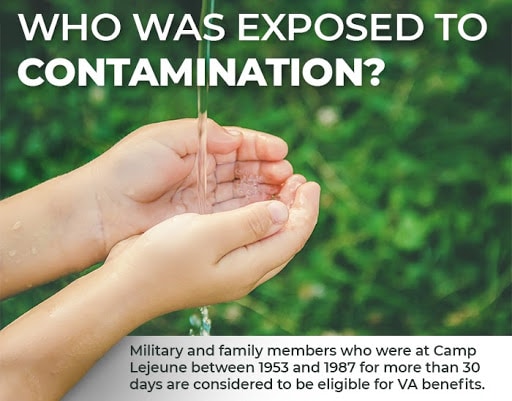
Who Was Contaminated at Camp LeJeune?
Military and family members who were at Camp Lejeune between 1953 and 1987 for more than 30 days are considered to be eligible for health care, health care reimbursements, and presumptive disability benefits (active duty military, reservists, and National Guard) for the listed conditions.
“Military” includes all active duty and reservists who were at Camp Lejeune for 30 days or more (does not have to be consecutive). Camp Lejeune covers the area including a 246 square mile area North to Jacksonville; West to Hubert, South to Holly Ridge, and East to St. Rd. 50/Padgett Rd.
Neurobehavioral Effects Due to Contaminated Water
The term “neurobehavioral effects” specifically refers to conditions related to the relationship between the action of the nervous system and behaviors. This does not include neurologic disorders such as Alzheimer’s and Parkinson’s disease, although Parkinson’s disease is presumptive.
Symptoms of neurobehavioral effects include headaches, lack of coordination, sensory disturbances, confusion, depression, tension, trouble concentrating, alterations in neurobehavioral testing that indicate deficits in attention, reaction time, visuomotor coordination, motor function, digit symbol, and contrast sensitivity. It also includes some learning or behavioral disorders.
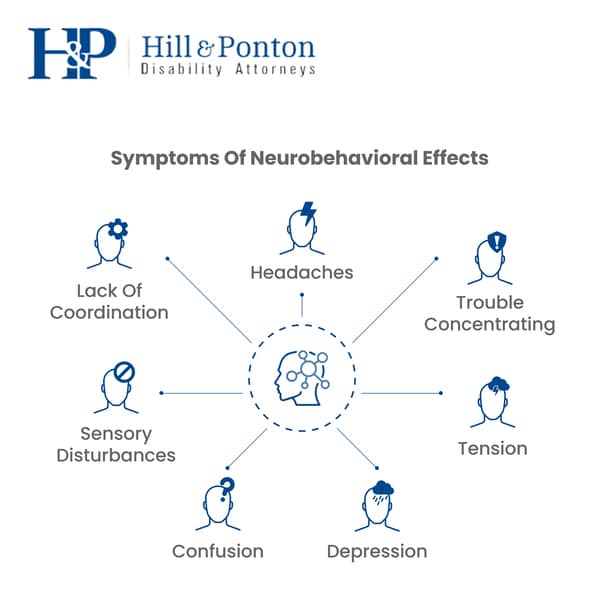
Neurobehavioral Deficits and Tests
Identifying and testing for neurobehavioral deficits can be complicated. There are thousands of testing practices, and it is a science in of itself to determine which ones are best for the given disorder.
Neurobehavioral specialists base their testing decisions on whether the patient is a child or adult, as well as whether the disorder is linked to toxins or genetics. We are going to look at adult/toxin testing options. Some of these testing options include:
- WHO Neurobehavioral Core Test Battery (WHO-NCTB): The World Health Organization (WHO) decided on a screening battery that sampled the widest possible range of functions that could be completed in an hour. The seven most widely used toxins, including lead, mercury, and carbon disulfide, were included and while the test was accurate, it was timely and costly.
- Neurobehavioral Evaluation System (NES): Created in the mid-1980s, computer-based testing largely documenting adverse effects of workplace exposures common during the 1990s.
- Adult Environmental Neurobehavioral Test Battery (AENTB): Expanded recommendations of the NCTB and the NES with a wider series of functions and greater sensitivity for lower exposures found in the environment.
There are many more testing options available, but a neurobehavioral specialist will be able to choose the correct test and document the most accurate results based on the specific effects one is experiencing.
Why Get Tested?
Testing can identify function and dysfunction and discriminate group differences by chemical exposures. This helps a claim by providing a diagnosis of the specific neurobehavioral effects, as well as which chemical exposures are most likely responsible.
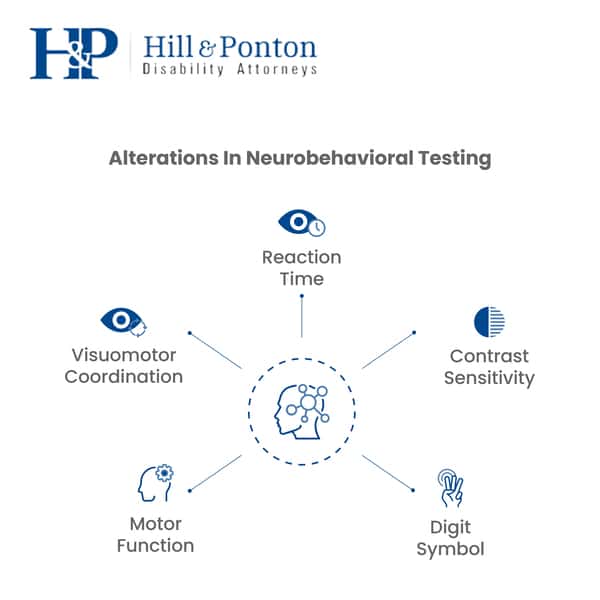
Is VA Health Care Available?
VA Health care is available for all military personnel, whether they are receiving disability or not, who were stationed at Camp Lejeune during the contamination period.
Health care and health care reimbursements are also available for their family members and civilians who experienced any of the 14 qualifying health conditions through the Caring for Families of Camp Lejeune Act of 2012. Any military members, including reservists, are also eligible for the health care and reimbursements through this act if they are not service-connected for their conditions.
Can you receive disability compensation for exposure to Camp LeJeune contaminated water?
Those eligible for presumption claims due to contaminated water at Camp Lejeune must meet the following eligibility requirements:
- Be a Veteran, Reservist, or National Guard member who was discharged under conditions other than dishonorable;
- Have served at Camp Lejeune for any period, resulting in a minimum of 30 days, between August 1, 1953, through December 31, 1987; and
- Have a current disease on the list of presumptive conditions related to Camp Lejeune:
- Adult Leukemia
- Aplastic Anemia and other myelodysplastic syndromes
- Bladder Cancer
- Kidney Cancer
- Liver Cancer
- Multiple Myeloma
- Non-Hodgkin’s Lymphoma; and
- Parkinson’s Disease
Evidence requirements include:
- Service documentation of official orders or assignment to Camp Lejeune or the Marine Corps Air Station New River in North Carolina for any period between August 1, 1953, and December 31, 1987;
- Have been on active duty, reserve, or National Guard capacity;
- Have a diagnosis of one of the current diseases on the list of presumptive illnesses for Camp Lejeune.
Other Active Duty Military or Reservists may apply for direct service connection if they did not meet the 30-day minimum requirement but feel that they have a condition related to Camp Lejeune contaminated water. Under this path, a nexus from a doctor, usually a specialist in environmental toxins, is suggested to help in proving a nexus of the condition to the water contamination.
Have Questions About Your Claim?
If you or your family were affected by toxic water at Camp Lejeune, the attorneys at Hill & Ponton are here to help. If you had a VA claim denied, contact us for a free case evaluation.
